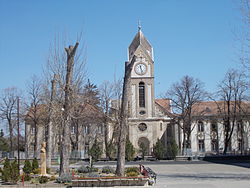Vecsés
Vecsés
Wetschesch | |
|---|---|
 The church | |
 Location of Pest county in Hungary | |
| Coordinates: 47°24′21″N 19°15′53″E / 47.40570°N 19.26477°E | |
| Country | |
| County | Pest |
| Area | |
• Total | 36.18 km2 (13.97 sq mi) |
| Population (2009) | |
• Total | 20,550 |
| • Density | 518.79/km2 (1,343.7/sq mi) |
| Time zone | UTC+1 (CET) |
| • Summer (DST) | UTC+2 (CEST) |
| Postal code | 2220 |
| Area code | 29 |
Vecsés (German: Wetschesch; /ˈvɛt͡ʃɛʃ/) is a town with a population of 21,795 inhabitants, located in the Budapest metropolitan area in Pest County, Hungary. Situated just southeast of Budapest and adjacent to Budapest Ferenc Liszt International Airport, Vecsés is an important location in Hungary's transport network. The town is well-connected to Budapest by both road and rail, making it a key area for residents and businesses alike, benefiting from its proximity to the airport and the capital.
History
[edit]Vecsés' history can be traced back to the medieval period. The first known mention of the settlement dates to 1300 when it was referred to as "Veches." During the medieval era, the area was part of the Kingdom of Hungary, and it was primarily an agricultural community. The name Vecsés is believed to have been derived from the personal name "Vech," which was common in the region at the time.
In the 16th century, Hungary faced significant turmoil due to Ottoman invasions. Vecsés, like many other villages in Hungary, suffered from the effects of the Ottoman occupation, which included destruction, depopulation, and a shift in settlement patterns. However, after the end of the Ottoman occupation in the late 17th century, the area began to recover.
Development in the 18th and 19th Centuries
[edit]In the 18th century, Vecsés began to thrive once again under the rule of the Habsburgs. The settlement’s location near the Danube River and its fertile land made it an important agricultural area. The town’s economy during this time was based mainly on agriculture, including farming, cattle breeding, and viticulture. Vecsés also became known for its vegetable production, particularly cabbage, which remains a symbol of the town today.
During the 19th century, Vecsés became increasingly integrated into the Hungarian transport network due to its proximity to the major cities of Pest and Buda (now part of modern Budapest). The opening of the railway line in the mid-1800s facilitated trade and allowed for the development of industries in the area.
20th Century
[edit]The 20th century saw Vecsés continue to grow, particularly after World War II. The establishment of the Budapest Ferenc Liszt International Airport (formerly known as Ferihegy Airport) in the 1950s, located near Vecsés, had a significant impact on the town's development. The airport’s proximity brought increased economic opportunities, as well as migration into the area.
In the post-war period, Vecsés underwent urbanization and became a more industrialized town, though it retained much of its rural character. This period also saw significant changes in the population structure, with the development of residential areas and the growth of local infrastructure.
Modern Era
[edit]Today, Vecsés is a thriving town that blends modern amenities with its agricultural roots. It is known for its transportation links, with easy access to Budapest via both road and rail, and its proximity to the airport, which continues to be a key factor in its economic activity. The town has become a hub for both residential living and industrial activities, with many businesses and service providers setting up operations in the area.
Vecsés has also become a center for regional culture, offering a variety of festivals and cultural events, as well as preserving its historical landmarks, such as its churches and old buildings. The town’s development is balanced with efforts to maintain green spaces and protect its agricultural heritage.
Economy
[edit]At one time the airline Wizz Air had its head office in the Airport Business Park C2 in Vecsés.[1] The airline moved into its current head office on the property of Budapest Liszt Ferenc International Airport in the northern hemisphere summer of 2011.[2]
Transport
[edit]- Bus-lines
The autobus company "VOLÁNBUSZ" operates 3 buses to Vecsés town:
- 1. Vecsés, Erzsébet tér > Budapest, Kőbánya-Kispest vá.
- 2. Vecsés, Sportpályam > Budapest, Csévéző utca
- 3. Vecsés, Anna utca > Budapest, Népliget and Budapest Transport serves one line to Vecsés
- 4. Route 200E (Budapest, Kőbánya-Kispest railway and subway station > Budapest, Liszt Ferenc Airport Terminal 2)
Twin towns – sister cities
[edit] Lăzarea, Romania
Lăzarea, Romania Rheinstetten, Germany
Rheinstetten, Germany
Gallery
[edit]References
[edit]- ^ "Company information". Archived from the original on 12 March 2009. Retrieved 25 October 2009. "Wizz Air Hungary Airlines Ltd. Airport Business Park C2, Lőrinci út 59 2220 Vecsés, Hungary"
- ^ "Property development Archived 24 December 2011 at the Wayback Machine." Budapest Liszt Ferenc International Airport. Retrieved on 11 December 2011.
- ^ "Testvérvárosok". vecses.hu (in Hungarian). Vecsés. Retrieved 7 April 2021.
External links
[edit]- Street map (in Hungarian)










